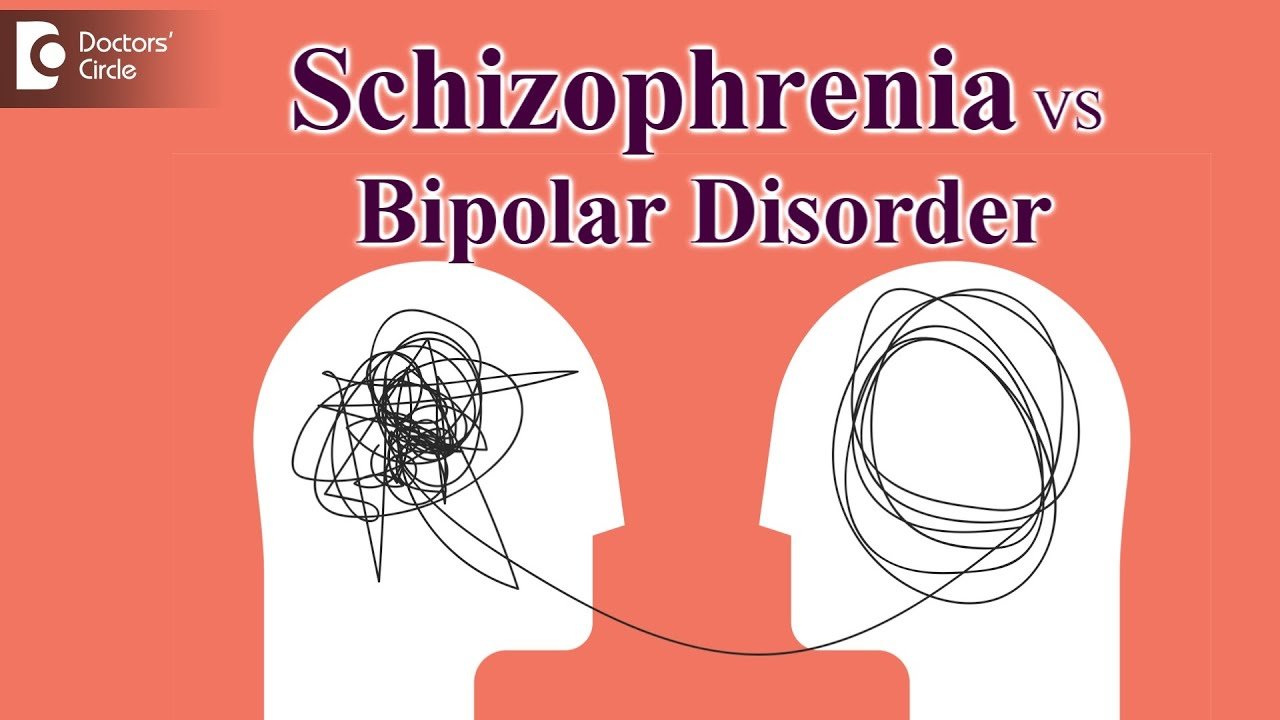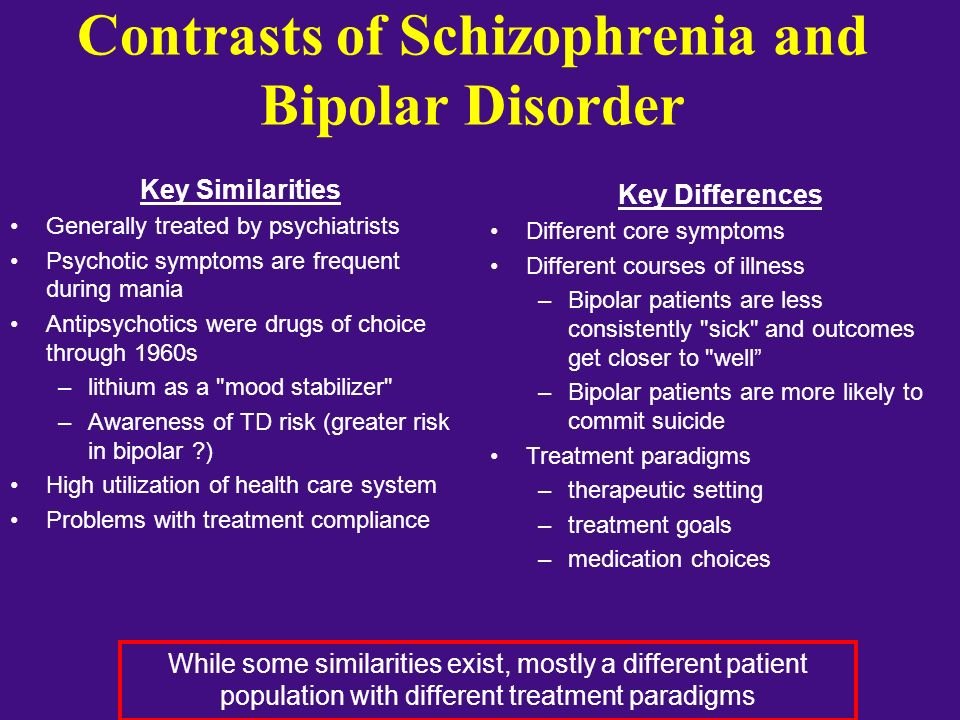What is the Difference Between Bipolar Disorder and Schizophrenia

It is common to talk about disorders such as schizophrenia and bipolar disorder. This is because both have much in common and sometimes the concepts are confused. Even though there are some similarities they are two very different diseases.

Bipolar Disorder and Schizophrenia
The discovery of a genetic link between schizophrenia and bipolar disorder is interesting because, as we know, both disorders cause many problems in people’s thought processes.
However, there are differences that distinguish them, even though for many professionals it may be difficult to differentiate them because their symptoms are very similar.
But how do you know how to difference between bipolar disorder and schizophrenia? This article explains what each of these disorders consists of, so that you can finally know the difference between bipolar disorder and schizophrenia.
What is Bipolar Disorder
Bipolar disorder is a fairly common mood disorder characterized by extreme fluctuations in mood, energy and performance.
This means that there are manic and depressive episodes, and the two constantly alternate. These episodes last approximately weeks to months.
For example, a person experiencing a manic episode may subsequently feel full of vitality and energy, ready to “eat the world,” able to multitask and ready to tackle any challenge or goal.
However, after a while comes the opposite, a depressive episode, in which the person feels empty and helpless, unable to perform any of the tasks he or she used to do, unable to achieve his or her goals and objectives, and with the feeling that nothing makes sense.
It must be said that the ups and downs experienced with bipolar disorder are different from the ups and downs that people without bipolar disorder consider normal.
The ups and downs caused by this disorder can cause serious problems in all or almost all areas of life.
The illness is also considered dangerous because during a depressive episode a person can harm himself or herself and even die.
Symptoms of bipolar disorder
The symptoms of bipolar disorder vary according to the episodes the person experiences, with mania and depression alternating.
It is also important to remember that symptoms manifest differently in adolescence and adulthood. The main psychological, behavioral and physical symptoms usually observed in patients with bipolar disorder are as follows
- Self-destructive behavior
- Not going to school or work
- Delusions of grandeur
- Elevated energy levels or lack of energy
- Quietness
- Emotional emptiness
- Weight gain or loss
- Quickly changing the subject when talking to someone
- Sadness
- Suicidal thoughts
- Low self-esteem
- Feelings of guilt or worthlessness
- Physical and mental sluggishness
- Confused thinking and inability to concentrate
- Lack of sleep but vitality
- Inability to feel joy
- Extreme anxiety
What is schizophrenia?
Schizophrenia is a serious mental disorder problem affecting the way people think, feel, and behave.
Schizophrenia is less common than other mental disorders and affects 7 or 8 out of every 1,000 people.
This type of illness is classified as a psychotic disorder and can be extremely disabling physically, as patients lose touch with reality, suffer from hallucinations and are socially impaired.
The first symptoms of schizophrenia usually appear between the ages of 16 and 30, and often do not develop until after the age of 45.
Symptoms of Schizophrenia
The schizophrenia symptoms are divided into three different categories: positive, negative and cognitive. The following is a brief description of each.
1. positive symptoms
These are psychotic behaviors that do not usually occur in healthy people. This type of symptom may be transient, appearing and disappearing in some people, while in others it may persist for a long time.
These symptoms can be quite severe, but may be barely noticeable. Their severity depends on whether or not they are treated. Some of these symptoms can seem like this:
False notions are created, for example, people believe they are being persecuted or spied on, that they are famous, or that they have done things in the past that never happened.
They also include hallucinations, in which they hear, smell, taste or see things that do not really exist.
For example, they may hear orders from an imaginary voice telling them what to do at a certain time….
Finally, there are changes in language and thinking, tendency to talk nonsense, inability to hold a conversation, topics that easily change to something else, etc.
2. Negative symptoms
These are the most difficult symptoms to recognize, as they are often confused with depression or other illnesses. These types of symptoms include.
Decreased speech, feeling tired when talking, isolation from others, indifference to everything.
- Decreased ability to express emotions.
- Feeling of emptiness and dissatisfaction.
They also tend to be very neglectful of their immediate environment and may appear depressed or sluggish.
3. Cognitive symptoms.
Like the negative symptoms, these are symptoms that are difficult to be aware of. Changes in memory and thinking may be noted. These symptoms include.
Decreased ability to understand, store and use information to make decisions.
Reduced ability to make use of newly learned information, concentration problems, leading to poor social and work performance.
Differences of Bipolar Disorder and Schizophrenia
After detailing what bipolar disorder and schizophrenia are, here are four main differences between the two illnesses.
Bipolar disorder usually begins (at least in some cases) with the experience of depressive and/or manic episodes. In contrast, schizophrenia usually begins with symptoms of delusions and hallucinations, and bizarre behavior that cannot be easily explained.
Most patients with schizophrenia are quite introverted and tend to isolate themselves from others. In contrast, patients with bipolar disorder are usually very sociable.
The main characteristic of bipolar disorder is rapid mood swings, while schizophrenics may experience hallucinations and a lack of contact with reality.
People with schizophrenia almost always show depressive symptoms, whereas people with bipolar disorder only show depressive symptoms when faced with a depressive episode.
Conclusion
Always consult with your doctor about your mental health. Only a medical professional such as a psychiatrist can determine if you have bipolar disorder or schizophrenia. Even though they have many similarities they are two different types of mental illness. If you have any questions about the type of mental illness you have, get with a medical professional and let them determine which type of mental illness you have. Only a medical professional such as a psychiatrist can figure out if you have bipolar disorder or schizophrenia.
Leave a Reply